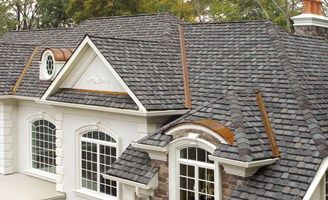Roof Shingles Vs Slate

The weight of rubber shingles or rubber slate is a lot less than real slate or concrete tiles.
Roof shingles vs slate. Slate is a premium roofing product and widely used while building expensive custom homes. You do not have to worry about stepping on the wrong spot and cracking a shingle because of how flexible rubber is. They are made from roofing so the finished product is a roofing roof. Shingles on the other hand tend to come in a wider range of colours.
Slate roofing can last for 100 years however which means that one slate roof could last as long as five 3 tab asphalt shingle roofs. This also means there are no extra support beams needed. Cost one of the main benefits of shingle roofs is the affordability. Unlike tiled roof systems like stone slate clay tiles concrete tiles etc.
Slate roofs can also help increase the value of the home. Regular slate requires extra reinforcement to hold the weight of the heavy shingles. Asphalt shingle has the lowest cost with the shortest life span and is the most common shingle type. Tile might require the use of reinforced roof framing but as the same time it is highly resistant to fire.
It also requires reinforced roof framing. A slate tile is essentially rock perhaps with some composite material added to it and is not so much produced as it is cut. Due to their light weight delivery and installation are much easier and cheaper. Most mid quality houses have shingles installed on the roof.
Rubber shingles or rubber slate is walkable. Slate tile is much more expensive both for the material itself as well as the cost of installation. Synthetic slate shingles weigh a quarter of what regular slate shingles weigh. Although slates are lightweight synthetic slate is strong and flexible.
Two popular options year after year are shingle and slate tile roofs. Synthetic slate normally last much longer and perform better compare to architectural shingles but due to higher initial cost it is still less popular roofing material. Slate is fireproof is storm resistant is impermeable to water and staves off the growth of algae and moss that often is harmful to other shingle types. There are pros and cons to each so let s take a closer look.














































